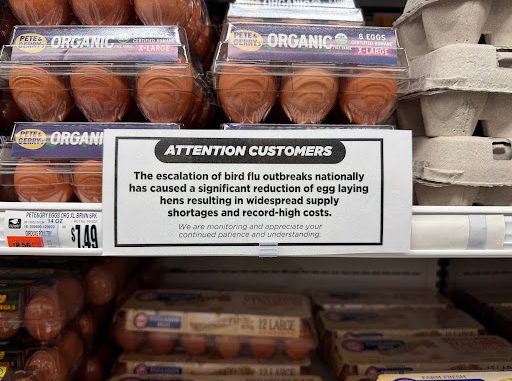
Avian influenza (bird flu) is on the rise. While it is not a new virus, the U.S. is currently seeing a dramatic increase in bird flu outbreaks. As of Feb. 14, 159,307,978 reported poultry have been affected by bird flu since February 2022. Cases have been found in all 50 states and Puerto Rico, and are now impacting multiple species.
On Jan. 30, the Ulster County Department of Health was informed of a case of bird flu in the county. Forty-eight of the 50 chickens and ducks died from the virus, and two were euthanized to prevent future cases.
With outbreaks getting closer to home, local farmers are taking measures to ensure their birds are healthy. Shelley Gray, owner of Gray Family Farm in New Windsor, attended the American Pastured Poultry Producers Association (APPPA) conference, where she learned more about the virus. “Because we’re outdoors, our birds are heartier and healthier,” said Gray. The birds they take to the processor have to cross state lines and must be tested before they do. “My flock is tested by Cornell,” said Gray. Gray Family Farms has not experienced any outbreaks.
The outbreak that the U.S. is experiencing right now is affecting more than just the egg-laying population. On Jan. 31, the U.S. Department of Agriculture (USDA) released an update confirming the first detection of a new highly pathogenic avian influenza genotype in dairy cattle. This new genetic variation poses the risk of new infections from birds into dairy operations, but does not necessarily increase the risk to cattle or human health.
According to the Cornell University College of Veterinary Medicine, “when one individual is infected with more than one type of influenza virus and the viruses mix their genetic material, genetic changes take place, creating new forms of the virus that can infect other species.”
As far as human cases are concerned, the risk is low to the general population, but people who work on farms, backyard poultry owners and veterinarians are at a higher risk. There have been human cases of bird flu in the U.S. According to the CDC, there is no known person-to-person spread at the time of publication. A study published on Feb. 13 revealed that three dairy veterinarians had undetected bird flu infections. Since one of them has only worked in states with no known bird flu outbreaks in cattle, this suggests that there could be more cases of infection that have not been reported.
In December, 13.2 million egg-laying hens were culled, and less egg-laying birds means less shells on the shelves. Stores like Target and Costco have placed limits on how many cartons of eggs each customer can buy due to supplier shortages. In January, the national average price for eggs was 153% higher than last year. The rising prices pose challenges for businesses. Locally, the New Paltz Bagel Cafe had to place a small price increase to cover the climbing costs of eggs.
Various health sources, such as the CDC, are frequently updating their sites with new outbreaks and information. As stated by Cornell University College of Veterinary Medicine, “It is important to understand how we can reduce our risk of exposure, to protect our own health as well as that of our pets and livestock. Reducing our exposure will also help slow the virus from evolving into something that is more easily transmissible to and between people.”
CORRECTION: An earlier version of this article’s headline incorrectly reported that the case of bird flu was found at a Kingston Farm. The exact location of the case is not known at this time.
